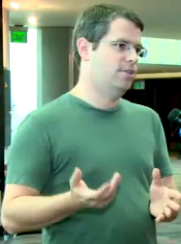As usual, Google’s Matt Cutts had some interesting things to say, speaking at Pubcon in Las Vegas.
The biggest thing Google has probably done for its users recently is increase the speed of search results. Cutts referred to things like Caffeine, realtime search, Google Instant, Instant Previews, and Gmail’s priority inbox as examples. Things like Twitter were making people expect things faster, he said. So that appears to be what Google has focused on the most in recent memory.
Some of these features have been somewhat controversial. Google Instant, for example, has been around for a while now, and I still hear people complain about how "annoying" it is. The recent launch of Instant Previews has only added to this. It’s unclear just how popular this kind of opinion is compared to those who like the features, but those complaining seem to still be using the search engine for the most part, so I guess they haven’t been turned off too much.
Cutts says Google Instant is a way to speed up your decisions, but even he acknowledged that power users tend not to like it, but pointed out that it can be turned off.
User behavior will change with Google Instant, Cutts said, but added that it’s not something webmasters should be worried about.
Another thing that turns Google users off, however, is bad content. According to Cutts, there is a debate going on internally at Google over whether they should consider content farms web spam. Rich Skrenta’s Blekko was mentioned, as it has innovated with its slash tags that allow human recommendation. Cutts says they’re wrestling about this at Google, so it will be interesting to keep an eye on that.
Users are pretty angry with content farms, he says, adding that there may be a time for web spam at Google to take action against them. It’s worth noting that when we talked to Cutts at SMX Advanced back in the summer, he mentioned that Google’s infamous "Mayday" update tends to affect auto-generated and content farms the most, but the update was not part of the web spam team’s efforts. It was part of general search quality, with no human intervention involved. It’s strictly algorithmic.
 Cutts also pointed out that Google hasn’t stopped working on paid links, and that people get sneaky and pay college students to put links on their pages about debt consolidation. He said Google is doing a big push on link spam, and that they have two or three things coming up in this area (without getting intos specifics of course).
Cutts also pointed out that Google hasn’t stopped working on paid links, and that people get sneaky and pay college students to put links on their pages about debt consolidation. He said Google is doing a big push on link spam, and that they have two or three things coming up in this area (without getting intos specifics of course).
Google has made spam reporting easier with a recently released web spam report Chrome extension. Cutts says Google wants to prioritize spam reports based on user impact, and that if you’re doing a spam report that has a bigger impact, it will look at it manually.
Google is also looking at domain match and whether that should really be ranking you higher, he said.
You should care about conversions, rather than ranking though, according to Cutts, and faster-loading sites usually help conversion, he says. Google rolled out how to crawl Ajax (which Twitter and Facebook have both adopted), and webmasters can add an exclamation after a hash tag in a URL to tell Google you want that remaining part of the URL indexed too.
Site speed is a factor in Google’s rankings, and while it’s not anything to panic about, he says, it can increase your ranking and conversions.
He said if there’s one takeaway he wants people to know, it’s that Google has started contacting people when they see suspected hacking or an increase in crawl errors. He asks that webmasters enable email forwarding, because they have trouble reaching them otherwise. Turn on the ability to get emails in Webmaster Tools.